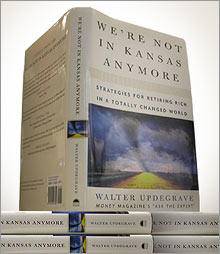|
|

|
|
More information on Updegrave's new book.
|
|
|
|
|
|
|
NEW YORK (CNN/Money) -
My girlfriend is researching graduate schools, and they range from our fine state university at $6,000 a year to a New England near-Ivy League school at $40,000. Can the $40,000-a-year school really provide an education that will offer job opportunities lucrative enough to offset its higher cost? Or should she just go with the $6,000-a-year school?
-- Jason Beck, Annville, Penna.
You've raised an interesting question that, alas, doesn't have a simple answer. There's little doubt that by opting for a costly education at a top school rather than attending a less expensive and less exclusive institution can, on average, generate future earnings that more than make up for the higher cost of the elite school.
But that doesn't necessarily mean that the more expensive school is the better bet for a particular individual, financially speaking.
Why? Well, think of it this way. The most selective -- and generally most expensive -- schools also tend to attract the brightest students. And those are precisely the type of people you would expect to do well in the workforce no matter where they went to school.
Comparing apples to apples
So the question becomes this: after adjusting for the difference in tuition, would a bright student attending an Ivy League-caliber school earn more over his lifetime than he would have earned by going to a less prestigious and less costly school?
In other words, the issue comes down to whether the superior earnings stem more from the institution or reflect the more qualified student's higher abilities.
There's research that supports both possibilities. In attempt to control for the "selection effect" of more prestigious schools having access to the best students, Princeton economist Alan Krueger and Andrew W. Mellon Foundation researcher Stacy Berg Dale looked at students who were smart enough to be accepted at elite schools but who then chose to go to less selective institutions.
After comparing their later earnings, Kreuger and Dale concluded in a research paper that the bright students who attended the costlier school did no better than similarly qualified students who attended less expensive schools. In other words, the students' intelligence and skills were more responsible for the higher earnings than the school.
A study on the same topic by Cornell economist Ronald Ehrenberg and two Rand Corporation researchers came to the opposite conclusion, finding that "even after controlling for selection effects, there is strong evidence of significant economic return to attending an elite private institution." What's more, this group even found some evidence that "this premium has increased over time."
Make the most of wherever you do go
So as much as I prefer giving definite answers, I don't think I can give one here. But, then again, I wouldn't get too worried about that. I mean, the mere fact that your girlfriend is going to grad school suggests the chances are pretty good she's going to have a nice life, financially and otherwise. I'm not sure it's worth getting overwrought about whether she's squeezing the absolute highest return out of her education dollars.
Besides, the studies I mentioned didn't account for other types of returns: the people you meet in school, the activities you participate in, the whole experience.
The returns, so to speak, you get in those areas will depend on how good a match a school is for you -- not just academically, but for you as a person. I loved going to a large school located in a big city. To another person that sort of setting might have seemed like being sentenced to four years of hell. So there's a lot to be said for considering factors other than tuition and prestige.
Finally, remember that a costly school may not end up being as costly as you think. Lots of expensive schools offer grants or other accommodations that can dramatically lower the cost.
Keep in mind too that the "prestige" effect can vary depending on where you end up living after graduation. An Ivy League-type school that opens doors in New York City might not generate as much of a stir west of the Hudson.
So if I were your girlfriend, I'd evaluate the choices and decide which I feel I'd most like to attend based on the quality of education and how comfortable I think I'd feel there. And if I could swing it financially, I'd go.
If it turns out that choice didn't yield the best return on my money -- although how you could know that I don't know -- no biggie. I'll still have gotten the education I want at an institution I liked, which isn't a bad deal at all.
For more on the majors with the best paycheck, click here.
Click here for the CNN/Money special report, "Back to School 2005."
Walter Updegrave is a senior editor at MONEY Magazine and is the author of "We're Not in Kansas Anymore: Strategies for Retiring Rich in a Totally Changed World."

|